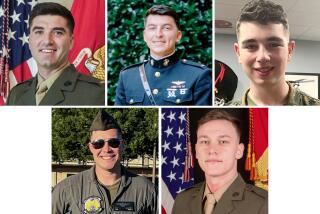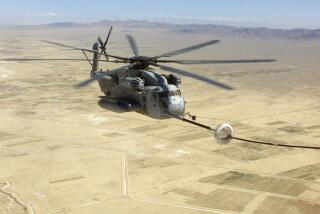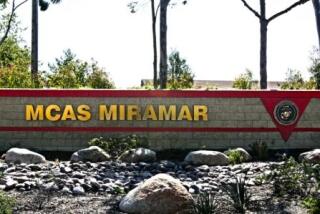18 Refueling Stops Later, 12 Hornets Buzz Home : Marines: A major’s wife and two dachshunds run to greet him on the Tarmac. The squadron lost none of its F/A-18s, used as Gulf War spotting planes.
EL TORO — The last of El Toro’s F/A-18 Hornets returned home Friday from the Persian Gulf to a waiting crowd of family, friends and two dachshunds with yellow ribbons.
A dozen Hornets flew over El Toro Marine Corps Air Station in groups of four before peeling off and circling to land. When they shut down their engines, they marked the end of a three-day trip and 18 refuelings between Bahrain on the Persian Gulf and El Toro, with stops in Spain, South Carolina and Yuma, Ariz.
The planes were part of an all-weather fighter-attack squadron sent to the Gulf in January. The squadron’s aircraft, a two-seat model of the F/A-18, were used as forward air controllers; they spotted targets over Iraq and Kuwait and guided bombers in to destroy tanks, buildings or antiaircraft artillery.
The job was dangerous because the Hornets had to remain over enemy targets much longer than the attack planes and bombers. But the Hornet squadron did not lose a plane during the war, according to Maj. Bill Cronin, a spokesman for the squadron.
Many times, according to Cronin, the Hornets would spot an enemy target and launch a missile that emitted a cloud of white smoke when it hit. The smoke would guide the other aircraft to the target.
Up to 8,000 Marines from the Tustin and El Toro bases were sent to the Gulf as part of the Mideast buildup. No one from either base was killed during the conflict.
Marine jet fighters from El Toro were among the first to blast Iraqi targets after President Saddam Hussein failed to withdraw from Kuwait by the Jan. 15 deadline.
Children, wives, relatives and friends carrying American flags ran to the planes as the pilots climbed from the cockpits.
Marine Capt. Carol McBride and her two dachshunds, Greta and Bumper, ran across the Tarmac to greet Maj. Michael McBride. She took the day off from her duties as captain for personnel at Camp Pendleton to greet her husband.
She said he had requested that she bring the dogs to his homecoming.
One of the returning pilots, Col. Donald Beaufait, executive officer of Marine Air Group 11, said the F/A-18s remained in the Gulf after the cease-fire to provide air support for ground Marines in case combat with Iraq resumed.
Jet fighters from the same squadron, based in Kaneohe Bay, Hawaii, also returned from the Persian Gulf on Friday, making a stop at El Toro. The planes will continued on to Hawaii next week.
Brig. Gen. Harold W. Blot, commander of the El Toro and other Marine bases in the West, shook hands and talked with the pilots as they climbed from their aircraft.
More to Read
Sign up for Essential California
The most important California stories and recommendations in your inbox every morning.
You may occasionally receive promotional content from the Los Angeles Times.










